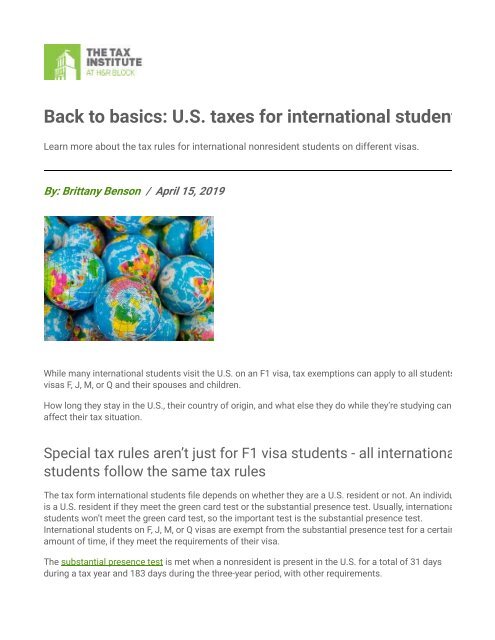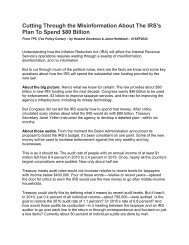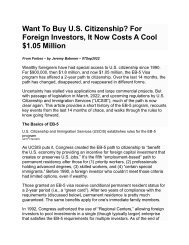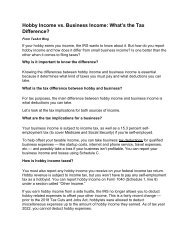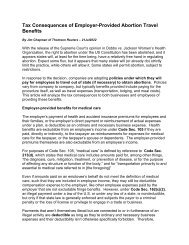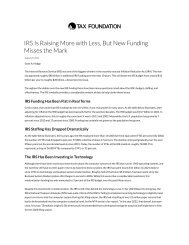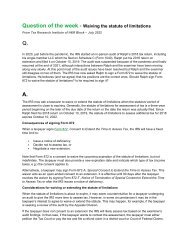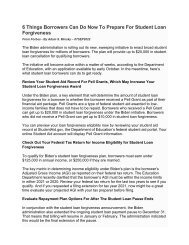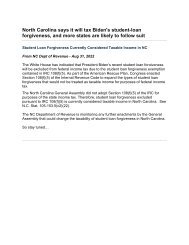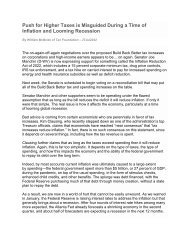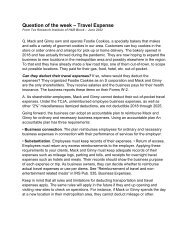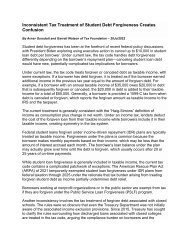US-taxes-for-international-students (1)
Create successful ePaper yourself
Turn your PDF publications into a flip-book with our unique Google optimized e-Paper software.
Back to basics: U.S. <strong>taxes</strong> <strong>for</strong> <strong>international</strong> <strong>students</strong><br />
Learn more about the tax rules <strong>for</strong> <strong>international</strong> nonresident <strong>students</strong> on different visas.<br />
By: Brittany Benson / April 15, 2019<br />
While many <strong>international</strong> <strong>students</strong> visit the U.S. on an F1 visa, tax exemptions can apply to all <strong>students</strong> on<br />
visas F, J, M, or Q and their spouses and children.<br />
How long they stay in the U.S., their country of origin, and what else they do while they’re studying can<br />
affect their tax situation.<br />
Special tax rules aren’t just <strong>for</strong> F1 visa <strong>students</strong> - all <strong>international</strong><br />
<strong>students</strong> follow the same tax rules<br />
The tax <strong>for</strong>m <strong>international</strong> <strong>students</strong> le depends on whether they are a U.S. resident or not. An individual<br />
is a U.S. resident if they meet the green card test or the substantial presence test. Usually, <strong>international</strong><br />
<strong>students</strong> won’t meet the green card test, so the important test is the substantial presence test.<br />
International <strong>students</strong> on F, J, M, or Q visas are exempt from the substantial presence test <strong>for</strong> a certain<br />
amount of time, if they meet the requirements of their visa.<br />
The substantial presence test is met when a nonresident is present in the U.S. <strong>for</strong> a total of 31 days<br />
during a tax year and 183 days during the three-year period, with other requirements.
International <strong>students</strong> are exempt from counting days <strong>for</strong> ve years from the rst date<br />
they enter the U.S.<br />
When a nonresident comes to the U.S. they will begin counting the days they are present in the U.S. <strong>for</strong><br />
the substantial presence test. International <strong>students</strong> can exclude the days they are present <strong>for</strong> any part of<br />
ve calendar years after the rst date they enter the U.S. as long as they are in school and meet the<br />
requirements of their F, J, M, or Q visa. This means that they won’t meet the substantial presence test as<br />
a student <strong>for</strong> ve calendar years and will le Form 1040NR.<br />
Example: Hans comes to the U.S. <strong>for</strong> the rst time as an <strong>international</strong> student from Germany on<br />
Jan. 24, 2019 on an F visa. He is exempt from counting days <strong>for</strong> the substantial presence test until<br />
Dec. 31, 2023, if he continues to study in the U.S. and meets the requirements of his visa. He will be<br />
exempt from counting days <strong>for</strong> part of 2019 and all of 2020, 2021, 2022, and 2023. He is a<br />
nonresident alien <strong>for</strong> those years, assuming he doesn’t meet the green card test during that time.<br />
He will begin counting days <strong>for</strong> the substantial presence test on Jan 1, 2024.<br />
It’s important to note that Hans cannot be exempt <strong>for</strong> any part of more than ve calendar years as a<br />
teacher, trainee, or student unless he establishes a closer connection to a <strong>for</strong>eign country.<br />
Other kinds of individuals on certain visas are exempt from counting days <strong>for</strong> the substantial presence<br />
test including teachers and trainees, diplomats, and professional athletes.<br />
J visa <strong>students</strong> and changing to a teacher or trainee designation<br />
One area of tax confusion <strong>for</strong> <strong>international</strong> <strong>students</strong> on J visas arises when a J visa holder is a university<br />
student and also a professor, assistant professor, or a trainee in a specic profession. A teacher or<br />
trainee is dened as anyone with a J or Q visa, other than a student, who substantially complies with the<br />
requirements of their visa. The distinction between the two is important because teachers and trainees<br />
are exempt from the substantial presence test <strong>for</strong> only two calendar years. They are not exempt if they<br />
have been exempt as a student, teacher, or trainee <strong>for</strong> any part of two of the last six calendar years.<br />
This determination is extremely important, especially <strong>for</strong> <strong>students</strong> who start graduate assistant programs<br />
that include student teaching or apprenticeships where their visa status changes from student to teacher<br />
or trainee. If they’re in the U.S. <strong>for</strong> more than two years, they might be a resident alien and will le Form<br />
1040 instead of Form 1040NR, as described below.<br />
International <strong>students</strong> usually le a tax return reporting annual<br />
income<br />
If an <strong>international</strong> student is a resident alien <strong>for</strong> U.S. tax purposes, then they will le Form 1040 using the<br />
same rules <strong>for</strong> U.S. citizens and resident aliens.<br />
Nonresident alien <strong>students</strong> le Form 1040NR, with exceptions<br />
If the <strong>international</strong> student is a nonresident alien <strong>for</strong> U.S. tax purpose, they are required to le Form<br />
1040NR if they have any taxable income during the year, with exceptions.
Nonresident alien <strong>students</strong> and scholars should be aware that they must le a return even if their only<br />
income is from a taxable scholarship, fellowship, or other education benet. Nonresident <strong>students</strong> must<br />
also le if they have income that is wholly or partially exempt under a tax treaty.<br />
Nonresident alien <strong>international</strong> <strong>students</strong> and scholars do not need to le a tax return if they have income<br />
only from <strong>for</strong>eign sources, interest income, tax-free scholarships, or any other income that is nontaxable.<br />
Sometimes F, J, M, or Q visa holders do not owe tax, but still have tax withheld from their income. If<br />
<strong>international</strong> <strong>students</strong>’ income is not high enough to create a tax liability, or if they can claim exemptions<br />
or credits, they may be able to get a refund of some or all of the withholding. Note that the 2017 Tax Cuts<br />
and Jobs Act (TCJA) suspended personal, spousal, and dependent exemptions <strong>for</strong> tax years 2018<br />
through 2025. Exemptions will be allowed again in tax year 2026.<br />
Nonresident alien <strong>students</strong> might also have to le other <strong>for</strong>ms, depending on their<br />
circumstances<br />
The <strong>for</strong>ms nonresident alien <strong>students</strong> need to le may vary due to specic circumstances.<br />
• If a nonresident alien <strong>international</strong> student didn’t have any U.S. sourced income (other than bank<br />
interest):<br />
◦ Form 8843, Statement <strong>for</strong> Exempt Individuals and Individuals with a Medical Condition<br />
• If a nonresident alien <strong>international</strong> student had U.S. sourced income (other than bank interest):<br />
◦ Form 1040NR-EZ or Form 1040NR<br />
◦ Form 8843, Statement <strong>for</strong> Exempt Individuals and Individuals with a Medical Condition<br />
◦ A copy of Form W-2(s) (if applicable)<br />
◦ A copy of Form 1042-S (if applicable)<br />
Certain <strong>international</strong> student income is taxable, unless a treaty<br />
applies<br />
Some <strong>international</strong> <strong>students</strong> are exempt from U.S. tax <strong>for</strong> certain kinds of income under a tax treaty with<br />
their home country. The U.S. has income tax treaties with many (not all) countries, each containing its<br />
own benets <strong>for</strong> residents of a <strong>for</strong>eign country who temporarily visit the U.S. <strong>for</strong> the purpose of education<br />
or training. It is vital to read each treaty’s specic article because each treaty is different.<br />
Example: Hans receives a $5,000 (<strong>US</strong>D) scholarship from an organization in Germany <strong>for</strong> his<br />
educational expenses while he is in the U.S. on an F visa. Under the U.S.-Germany Tax Treaty, Article<br />
20(2), payments from outside <strong>for</strong> a student who is a resident of Germany are exempt from U.S. tax.<br />
And, because the savings clause (paragraph 1(b)(bb) of the 1989 Protocol) doesn’t apply to Article<br />
20(2), as long as Hans isn’t a U.S. citizen or green card holder, he qualies <strong>for</strong> the exemption in<br />
Article 20(2).<br />
Some treaties only allow U.S. tax exemption <strong>for</strong> certain kinds of <strong>international</strong> student income. Whether an<br />
<strong>international</strong> student’s income is taxable <strong>for</strong> U.S. purposes depends on the treaty. For example, the U.S.-<br />
Austria treaty only exempts income paid to <strong>international</strong> <strong>students</strong> from outside the U.S. or payments to<br />
business trainees and apprentices from U.S. tax. On the other hand, under the U.S.-Belgium treaty,
<strong>international</strong> <strong>students</strong> are exempt from U.S. tax on payments from abroad and up to $9,000 in personal<br />
services income <strong>for</strong> <strong>students</strong> and business trainees.<br />
Example: Hans receives $2,500 <strong>for</strong> working in a lab as a research assistant in his third year of<br />
school. Under Article 20(4) of the U.S.-Germany Tax Treaty, these payments are exempt from U.S.<br />
tax as long as he receives less than $9,000 per year and isn’t present in the U.S. <strong>for</strong> more than four<br />
years.<br />
Special treaty rules <strong>for</strong> <strong>international</strong> <strong>students</strong> from Canada, China, and India<br />
The U.S.-Canada Tax Treaty is unique because it exempts all earned income <strong>for</strong> nonresident <strong>students</strong> if<br />
they don’t earn more than $10,000 in the tax year but allows the U.S. to tax all income if the nonresident<br />
earns more than $10,000 in the year. Also, Canadian <strong>students</strong> who become resident aliens lose this<br />
benet.<br />
Under the U.S.-China Tax Treaty, <strong>students</strong> who are residents of China <strong>for</strong> treaty purposes are exempt from<br />
certain payments including payments from abroad, grants, and up to $5,000 per year in personal services<br />
income. Nearly all U.S. tax treaties limit benets to a specic number of years and sometimes benets<br />
are lost when a taxpayer becomes a resident alien. Unlike other treaties, the provisions of the U.S.-China<br />
Tax Treaty are not limited by a number of years.<br />
Example: Mei is enrolled in medical school in the U.S. where she rst arrived as a student on Mar.<br />
13, 2018. Mei will remain in the U.S. <strong>for</strong> school until August of 2024 when she nishes her studies.<br />
Although Mei will likely be a resident alien <strong>for</strong> U.S. tax purposes in the sixth year (2023), she would<br />
still qualify to claim the treaty benets allowed to <strong>students</strong> under the treaty, assuming she still<br />
meets the denition of a student and the requirements of her visa.<br />
Under the U.S.-India Tax Treaty, Indian <strong>students</strong> are allowed a standard deduction on Form 1040NR equal<br />
to the amount allowed on Form 1040. They are also allowed a personal exemption <strong>for</strong> a nonworking<br />
spouse and U.S.-born children. While the TCJA suspends personal exemptions <strong>for</strong> tax years 2018 through<br />
2025, Indian <strong>students</strong> can still claim the standard deduction. However, they can only use the standard<br />
deduction <strong>for</strong> Single and Married Filing Separate taxpayers ($12,000 <strong>for</strong> 2018) because nonresidents<br />
can’t le a joint return on Form 1040NR.<br />
The rules <strong>for</strong> residency don’t apply to state return ling<br />
Depending on the nonresident alien <strong>students</strong>’ state, they may also be required to le state tax documents.<br />
The rules that apply to <strong>international</strong> <strong>students</strong> <strong>for</strong> U.S. federal income tax purposes don’t apply to statelevel<br />
residency determinations. Some states allow <strong>international</strong> <strong>students</strong> to exclude days <strong>for</strong> state<br />
residency purposes while others do not. Each state’s residency rules must be consulted to determine<br />
whether the <strong>international</strong> student must le a resident or a nonresident state return.<br />
Also, some states allow treaty benets on the state return. Depending on where the payment to the<br />
<strong>international</strong> student originates, income may be taxable on a state return and cannot be excluded by<br />
treaty.
Assisting an <strong>international</strong>, nonresident student can be tricky but a careful reading of the tax treaty,<br />
protocols, and other resources can help shed light on valuable benets.<br />
H&R Block tax professionals, click to login to the Tax Research Center:<br />
• How should <strong>international</strong> <strong>students</strong> on F, J, M, or Q visas le their tax returns?<br />
• What are the treaty benets available under the U.S.-China Income Tax Treaty <strong>for</strong> Chinese <strong>students</strong><br />
and trainees in the United States?<br />
• What are the treaty benets available under the U.S.-India Income Tax Treaty <strong>for</strong> Indian <strong>students</strong><br />
and business apprentices in the United States?<br />
Brittany Benson<br />
Brittany Benson, JD, is a tax research analyst at The Tax Institute. Brittany<br />
specializes in the issues that affect Native American, <strong>international</strong>, and<br />
ministerial taxpayers.


